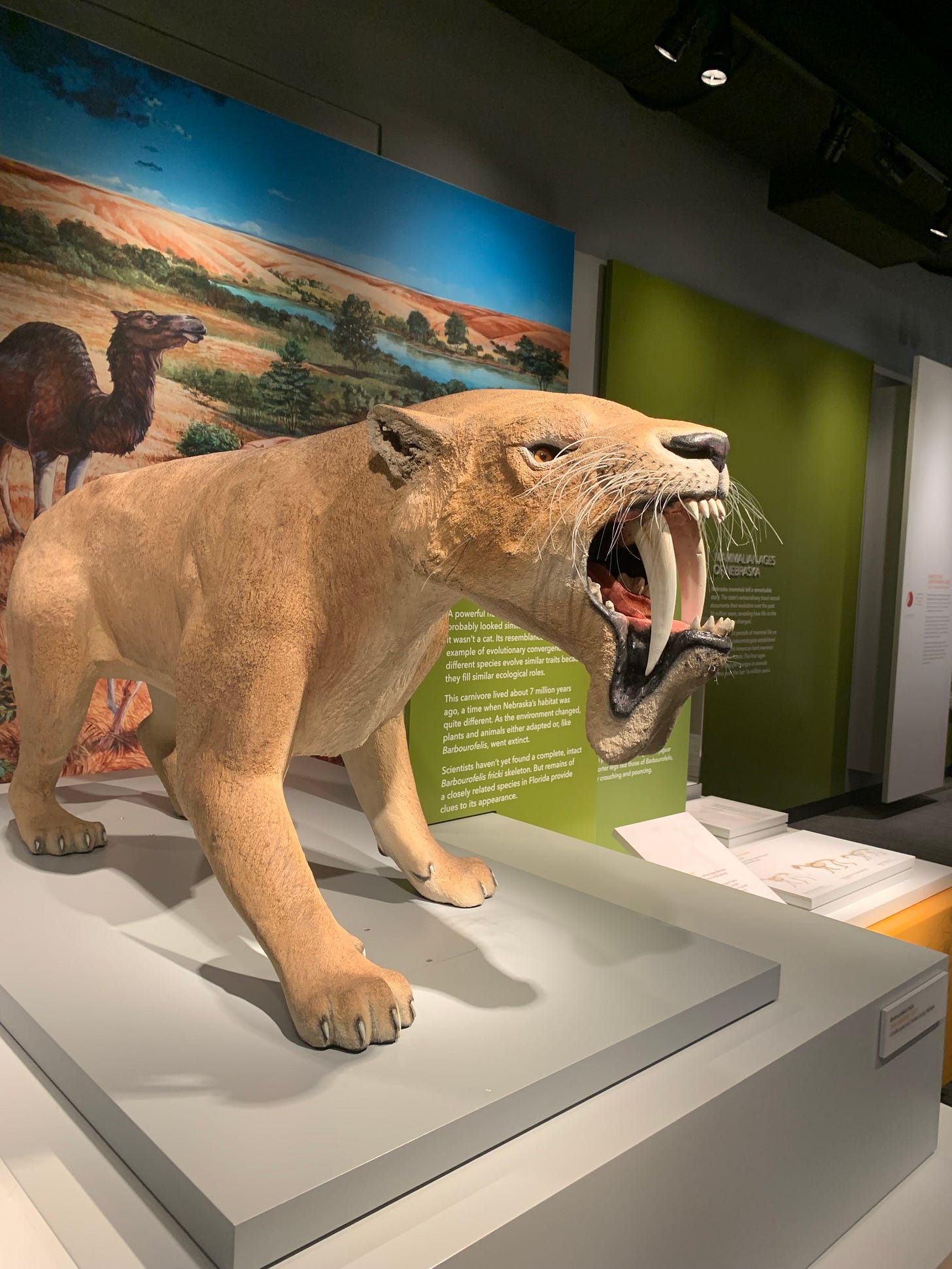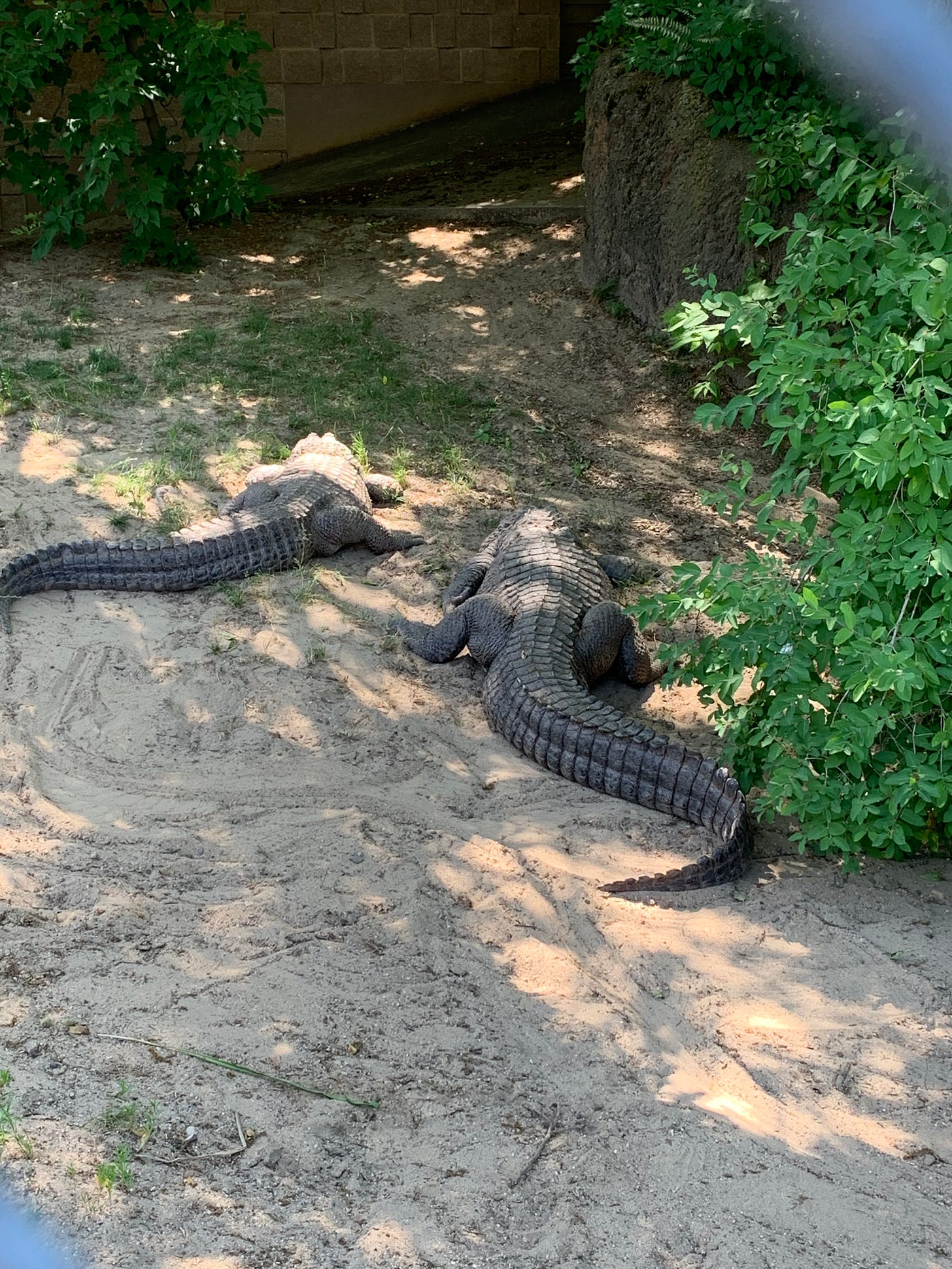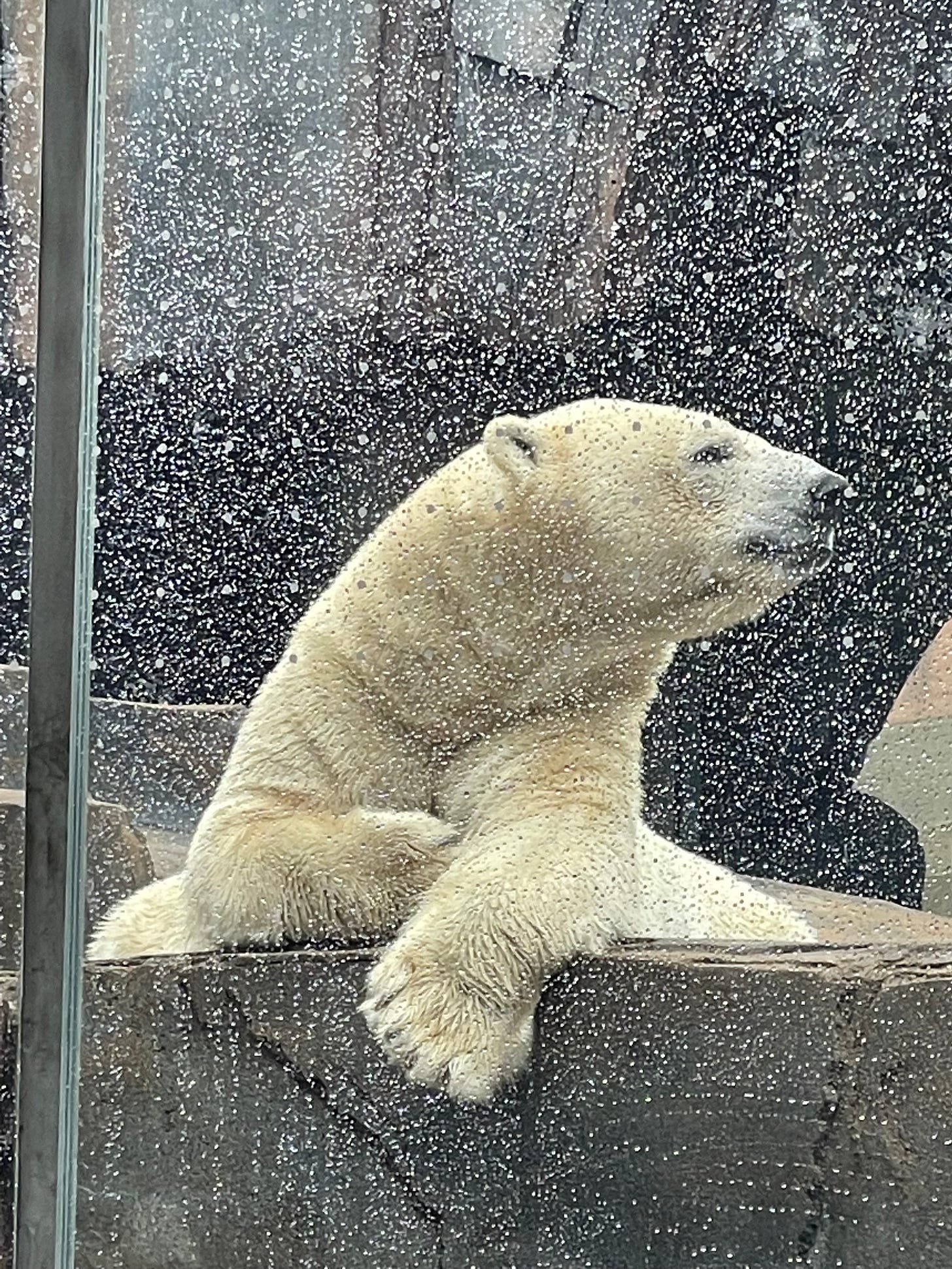A statue from the University of Nebraska Museum depicting a…um…I’m, uh, not actually sure what that thing is. BUT it looks ferocious and very frightening, so I decided to slap it on here.
What We Can Learn From Man-Eaters
K.L. Orion
Eight years ago, I found myself staring into the cold, quite literally dead (probably marble) eyes of two murderers. These cold-blooded killers were not inmates on death row. They weren’t even human. I was looking straight at the Ghost and the Darkness: The Tsavo Man-eaters. They were vicious male lions who had no manes, and that was the least odd thing about them. Rather than living in a pride, they lived together. But the thing they are obviously remembered for is their taste for human flesh.
The Tsavo Lions’ kill count is in the hundreds. Their habits of preying on people automatically made them enemies of the entirety of mankind, which was why I got the opportunity to see them in the first place. We killed them and had them taxidermied. One thing led to another and it eventually led to an eight year old kid getting to see the corpses of murderers on display in the Chicago Field Museum. At the time though, I didn’t think about it much. The thing I focused on the most was how uncanny the taxidermy was. It never really dawned on me that I was looking at two animals who had made their diets depend on upright primates with a sense of entitlement, like me. These were two animals who challenged the dominant species for their position at the top of the food chain. The fur I was looking at may have grown using nutrients these lions got from human blood. I was looking at two animals who were nourished by human meat.
Needless to say that we humans hate creatures like these. I mean, they were killed for a reason. As the undisputed dominant species, we despise anything that disputes us for that title. Civilization has disconnected itself so much from nature that we cannot even begin to imagine being preyed upon by something else.
Yet while we hate these beasts, we also love them.
Yes, I mean it.
The whole reason I knew about the Ghost and the Darkness before I saw them in person was because of my father, who seemed to have a deep fascination with anything that could prey on a human. My childhood is filled with him talking about giant green anacondas, mighty orca whales, and bloodthirsty great white sharks. His “passion” for human predators (or potential human predators) wore off on me in more ways than one. That “passion” is probably part of the reason I got into the Godzilla series. It is also probably part of the reason I became obsessed with it.
Yes, as someone who knows a thing or two about the big lizard, the Godzilla series is often downright goofy and bizarre. Half of the films were just shameless cash grabs. But if you choose to look over all of the bad special effects and horrible scriptwriting, you discover a story that resounds deeply with the human conscience. A story about a beast far more powerful than man. Human beings live at the mercy of Godzilla. I think that idea strikes a powerful chord embedded into my primate brain.
Godzilla is a modern incarnate of a tradition that goes back thousands upon thousands of years. As long as there have been storytellers, there have been monsters. Demons, ghouls, and savage beasts have scared and entertained human audiences for centuries. But those stories come from a deep rooted instinct in every animal.
The fear of predation.
For millions of years, humans and our ancestors lived in fear of very real monsters like the Tsavo Man-eaters. However, they weren’t rare cases of overly confident animals like the Tsavo Lions. Rather, predation on hominins was a very common thing. Everything from big cats to wolves to even giant birds has casted our ancestors into the shadows of fear at least at one point or another. While we might be the top dogs now, you don’t have to go very far back in geological time to find an era when we were at the bottom of the food chain. Fear of predators (monsters) is literally written in our DNA.
Of course, I just stated a bunch of obvious facts. Obviously we are evolutionarily inclined to fear things that want to eat us. Duh. But that’s not what I wanted to discuss. I have a bigger question.
If we fear man-eaters so much, why do we respect them?
Most things in the human experience that we consider enemies are things we hate. We hate problems. We hate our bullies. We hate our bosses. We hate our freaking political leaders. We don’t respect a lot of things we consider villains. But our relationship with man-eaters is different. Sure, a lot of people hate them. A lot of people who are affected by man-eaters (say someone who lost a family member to a shark attack or something) hates them. But the vast majority of us cozy Americans don’t hate them as much as we appear fascinated by them. Why?
I live in the middle of Iowa, where the biggest animal is a domestic cow and the most frightening animal is a rabid raccoon. I don’t live in immediate fear of these powerful lions and tigers. I don’t know the last time a local hunter told me a story about his best friend getting mauled or overheard a farmer talking about a big cat dragging human corpses into his field. I don’t know the last time because there never was a last time. Humans are supreme where I live. While there are plenty of natural spaces in Iowa, and plenty of wild animals, said wild animals are fairly mellow compared to those of the African savanna or the South Asian jungles. Growing up, I never lived in fear of any animal really.
People in my situation have alienated a natural pressure that still has profound effects on our instincts. The hatred-fear of man-eaters isn’t as strong as it should be. Rather, a different kind of fear resides in us and me. A fear that can easily become an interest. A “passion” maybe. I know personally the stories such as the Tsavo Lions and others like them intrigue me more than they make me sick. That seems like a twisted mentality, doesn’t it? However, I think it makes some sense when you consider this.
Growing up in a Christian dominated world, I have heard the phrase “God Fearing” multiple times. For years, I never understood it. Why should you fear God? Well, I guess there are plenty of reasons you could fear God, but aren’t Christians supposed to love God with all their hearts? Fear and love aren’t exactly similar things. Or at least, so I thought. I think “God Fearing” is supposed to refer to a very primal sense in us human beings that we have begun to forget as civilization advances. I usually associate fear with hate, but that is not always the case. Obviously fearing God isn’t supposed to make you hate God. Rather, it’s supposed to make you respect God.
Fear can create multiple different emotional responses, including the demand for respect. Sometimes, fear drives you to hate the thing you are afraid of. Other times, fear drives you to respect it. I believe that is the sort of fear Christians are talking about, and I also think that same mentality can apply to our strange obsession (and sometimes idolization) of man-eaters. Christianity is supposed to encourage humility in a race that idolizes itself. That’s why they talk about this kind of fear. This kind of fear demands respect. And this kind of respect demands humility.
Man-eaters and other powerful animals have much of the same effect on people. When the Tsavo Lions were alive, people saw them as a threat (rightfully so) and wanted them dead. But the moment they were dead, the hate-fear was gone. Now, all that remained was this sense of odd respect for these powerful animals. That’s probably a good part of the reason they were taxidermied and sent off to a museum. Sure, maybe part of it was a publicity stunt to cement man’s dominion over nature. But another part was nature’s dominion over man. Nature influenced us to be fascinated in the things nature uses to control us. Man-eaters inspire humility.
And we sometimes seem addicted to this humility.
Take Godzilla again. Here’s this symbol of nature’s wrath and power over humankind. Naturally, human audiences should hate him. But we began to idolize him. He became so popular that the filmmakers eventually made him a good guy in some of their films. It got even worse when people were still rooting for him even when he was pitted against us humans. People want to take Godzilla’s side for some odd reason, even though he represents something we should fear.
I’ve found this weird sense in all my research of challengers to the human throne. I’m deeply fascinated when reading stories about murderous tigers on a rampage, or massacres conducted by crocodiles, or sharks attacking boats. My favorite stories like these have to be stories from the whaling days, when certain whale individuals would fight back against whalers. That is essentially giant sea monsters fighting humans. But why am I interested in this stuff? Human nature should dictate that I be disgusted.
But I think we enjoy being humbled by nature in some cases. There’s this odd sense of belonging when considering we might not be at the top of the food chain. It feels more natural, more familiar. The human dominated world is frightening and new, and we humans who designed it are struggling to keep ourselves afloat in it. We seem to be a bit more at home in cases where we aren’t the rulers of our ecosystems. We feel a place of evolutionary belonging.
Humans seem to like things that have power over us. I’m not sure why, but we do. That’s probably why so many cultures believe in some sort of god. We naturally like to think there’s something higher than us. That’s part of the reason why the human-ruled world can be so frightening, because we seem to be the gods of this reality. The highest of the highest. But human nature doesn’t like to be the highest of the highest. We like to believe there’s something bigger than us, something more powerful. That brings up an odd question. I always wondered who or what were the first gods? How did we develop the idea of a god in the first place?
Perhaps the first gods were the things that preyed on us. The things that stalked us at night. The things that hid just behind our firelight, waiting to pounce. The things that we recognized had power over us. Perhaps in another time, the Tsavo Lions wouldn’t have been demons but gods. Perhaps the first gods were the man-eaters that a part of us hated, but another part of us respected.





You certainly can keep a reader engaged. I have always leaned a bit more to indigenous natives views of gods being more routed in nature. However many stories referenced monsters as gods. What we fear today certainly seems to be much different than in ancient times or in other less civilized areas of the world today.
I love your perspective on things!